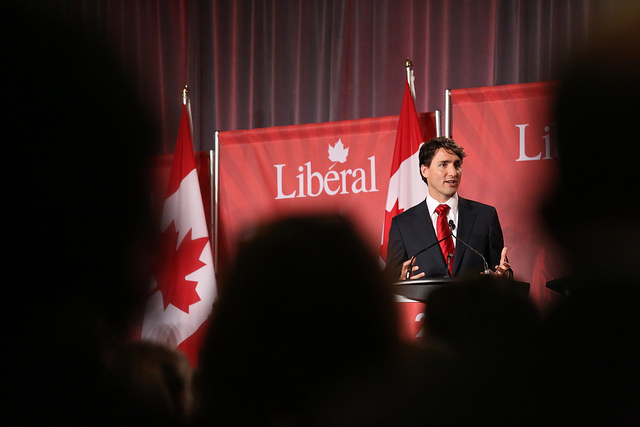The policy resolutions for the Liberal Party of Canada convention later this week in Montreal read like material the New Democratic Party would debate. Not only are they thoughtful, and progressive in tone, if implemented they would mark the launch of a peaceful revolution in Canada.
The 162 priority resolutions include proposals for a national transit strategy, an early childhood development program, a basic income guarantee, and affordable housing.
Policies of this nature have been discussed and debated by NGOs, academics, and various professional associations for years, without going anywhere.
Much is agreed about the benefits of decisive action in policy areas identified by the LPC. Sadly, Canada has been going backwards; on transportation, health science, protecting the environment, fiscal and foreign policy, and supporting manufacturing, culture or amateur sport. Canada being a corporatocracy — a society dominated by corporations — this should come as little surprise.
Turnings things around is going to require more than igniting parliamentary debate and working out policy understandings, but significant change that requires Parliament to act.
In putting forward ideas for debate, the Liberals are fulfilling the third-party role, well played in the past by the Reform Party, the CCF, and its successor, the NDP.
Reform introduced “faux” populism into Canada; small government and lower taxes were the hallmarks of the Chrétien/Martin era. The CCF provided the Mackenzie King Liberals with an incentive to introduce Old Age Pensions and Unemployment Insurance; while its successor, the NDP, supported the minority Pearson Liberals’ pledge, and medicare became available Canada-wide.
The Liberals have no intention of being a third party, however. The Montreal program shows only 150 minutes for plenary discussions of policy resolutions, less than one minute per listed resolution.
Also scheduled are seven hours of resolution debate in separate breakout sessions (run alongside sessions featuring MPs or invited speakers). For much of Saturday and Sunday, convention delegates can choose from successive concurrent sessions (expert panels, campaign training, policy resolutions or parliamentary affairs).
In his welcome to delegates, the Liberal Party president announces the convention is about mobilization and fundraising, giving Canada a Liberal government. If so, what the Liberals say they “stand for” on the economy, going into the convention, is a cause for dismay. Website ad-style copy on fiscal responsibility conceals any serious thought or intention to act. Yet, this blurb is supposed to reflect the policy resolutions from the most recent Liberal biennial convention.
A look at the line-up of featured plenary speakers suggests the main concerns of the LPC are marketing and learning from Obama Democrats. After the singing of “O Canada” the convention opens Thursday night with top journalist, now Liberal MP, Chrystia Freeland, interviewing Lawrence Summers, economist, former U.S. Deputy-Secretary, and Treasury Secretary, Harvard president, and economic adviser to Obama in his first term as U.S. president.
Back teaching at Harvard, Summers has something useful to say about economic stagnation, but he has a bad habit of mishandling important files, promoting financial de-regulation in the decade prior to the 2007-8 U.S. financial meltdown, for instance. Or advising Obama to go slow after his election, thus frittering away his period of greatest public legitimacy. Though Freeland cannot be expected to ask, it would interesting to know what he ever got right, let alone why he was asked to lead off the convention, rather than a Canadian with a better track record.
Justin Trudeau speaks Thursday night, bringing his “get ready” message to delegates. According to an interview last Saturday with Daniel Leblanc of the Globe, policy ideas will be revealed in a 30-minute speech Trudeau gives on Saturday (scheduled for 2:45 p.m.) expected to focus on education, job training and co-operation with the provinces, including on infrastructure.
Since the recession of 1981-82, the Liberal party has been a main instrument of corporate domination of Canada. Historically, it has also been a bellwether of where the country is going. Should the Montreal 2014 convention adopt progressive policy measures, that would augur well for good Liberal-NDP relations, promoted by Jack Layton to defeat the Conservatives, and surely welcomed by non-partisans anxious to see Canada abandon its failed experiment with corporate-friendly political economy.
Duncan Cameron is the president of rabble.ca and writes a weekly column on politics and current affairs.
Photo: Adam Scotti/Justin Trudeau/flickr



